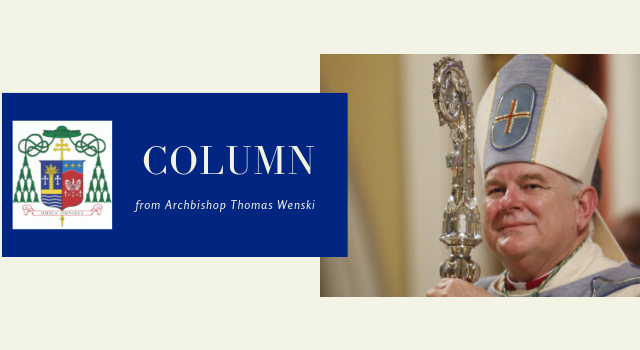By Archbishop Thomas Wenski - The Archdiocese of Miami
Even though our newspapers are never lacking in bad news to report about murders, killings, violence and hate, most of the innocents who die in our world die in anonymity and silence, unreported and un-mourned, except for their mothers’ sometimes belated remorse. The screams of these innocents are silent screams: I speak of the silent holocaust of millions of children killed in procured abortions � some 60 million in this country alone since the ill-fated Roe v. Wade decision. Worldwide, abortion today is the leading cause of death.
Legalized abortion has coarsened our regard for human life in all its stages � as utilitarian criteria are increasingly used to grant “value” or to decree “no value” to human beings. As St. Pope Paul VI warned in Humanae Vitae 50 years ago, a “contraceptive mentality” which views fertility as a disease to be treated has eroded the foundations of the family by weakening marriage and destroying the mutual trust between men and women, which is the necessary cement that holds together any committed relationship. Abortion, rather than protecting the rights of women to their bodies, protects the rights of men to the bodies of women.
The slippery slope that pro-life leaders warned against has arrived. Euthanasia, so-called therapeutic embryonic stem cell research, cloning, all have demonstrated that Roe v. Wade reveals itself as the fault line of our culture which threatens the future of our democracy. Indeed, the reason why our politics are so contested today, and partisan divisions run so deep, can be laid at the feet of Roe v. Wade. We see this on display whenever there is a Supreme Court nominee to be voted on in the U.S. Senate. In the Jan. 22, 1973 Roe v. Wade decision, the Supreme Court basically usurped the role of the legislature and, in an exercise of raw judicial power, imposed across our nation the most permissive abortion regime in the Western world.
The annual January March for Life will take place this year on Jan. 18. Held every year in Washington, D.C. with 100,000+ mostly young people braving rain, snow or sleet gives lie to the assertion by some pro-abortion advocates (including editorial writers) that the permissive abortion regime ushered in by Roe v. Wadeis “settled law.” Yet the hope of pro-lifers that originalist justices will overturn Roe v. Wade will not totally end abortion, but it would return lawmaking to state legislatures which are increasingly pro-life.
Our nation is increasingly rejecting abortion and Roe v. Wade as states continue to adopt more limitations on abortion and expand alternatives to abortion. But, in Florida, courts invoked the right to privacy in our state constitution to block a good law requiring a 24-hour reflection period prior to abortion. The court’s broad interpretation of our state’s privacy clause stems from a Florida Supreme Court ruling in 1989 against a law requiring parental consent prior to a minor’s abortion and poses unique challenges regarding abortion laws in Florida. So, even if Roe v Wade were overturned, the state of Florida could retain permissive abortion policies. There is, in a word, much work still to be done (and prayers to be offered) to assure that every unborn child is welcomed in life and protected by law.

